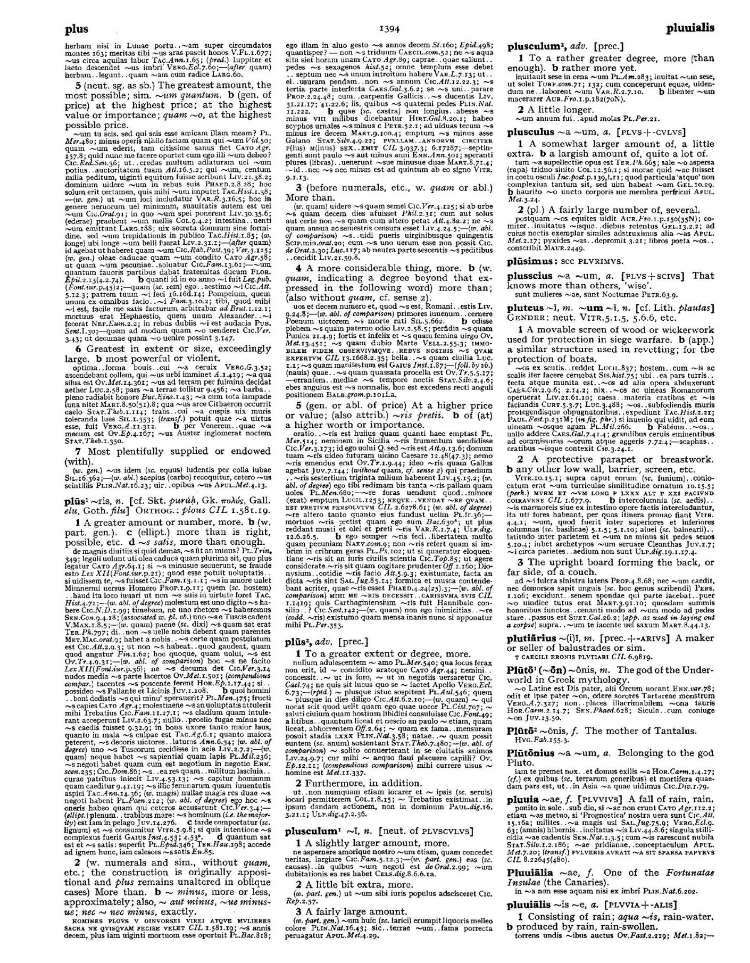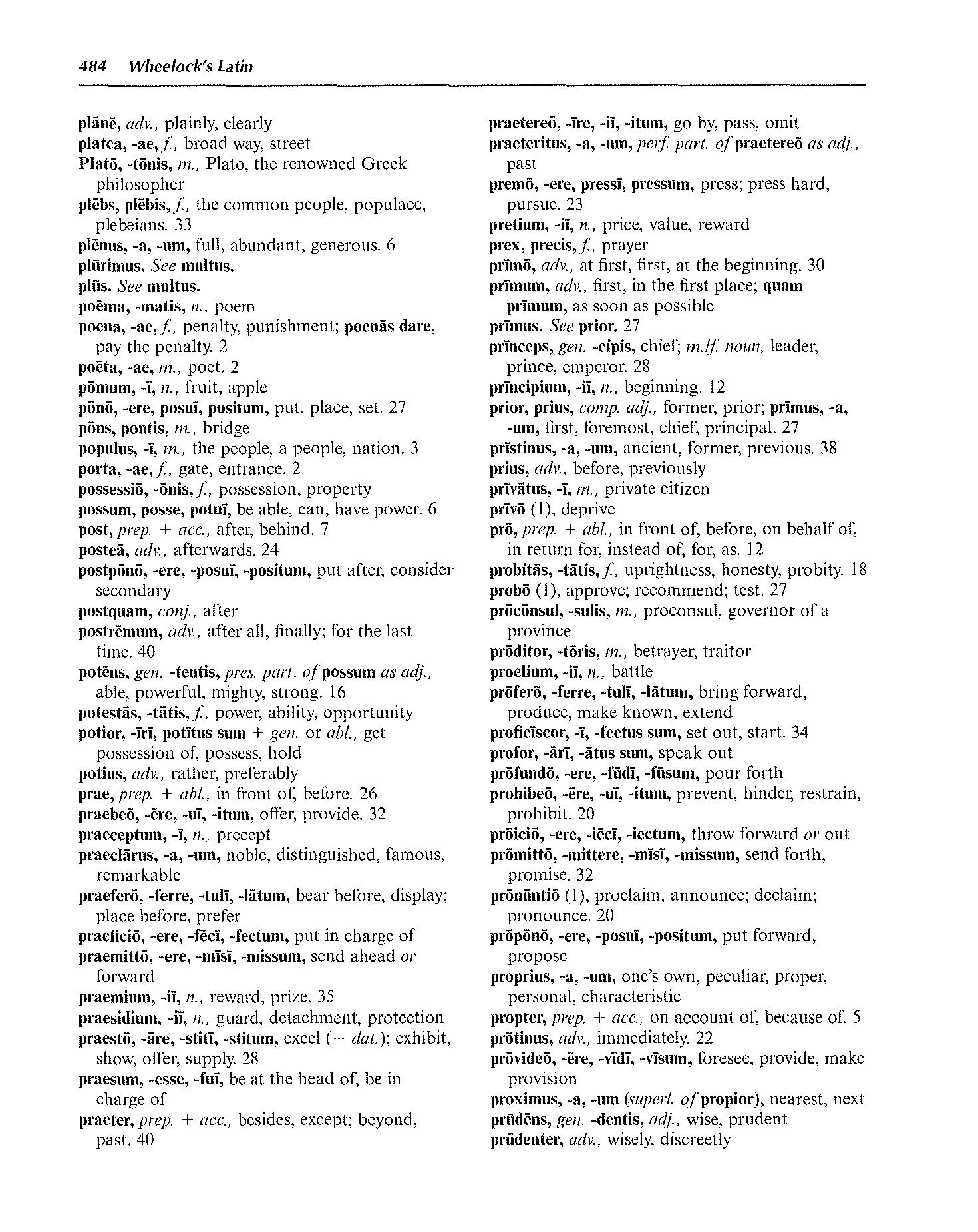
page_listing.tpl
page_subListingDetails.tpl
sub_listingDetails_style1.tpl
sub_listingDetails.title.tpl
plūs more
plūs is a Latin Adverb that primarily means more.
Definitions for plūs
Wheelock's Latin
Adverb
- 1
comparative of multus. much, many
Oxford Latin Dictionary
Noun
- 1
A greater amount or number, more. (b) (w. part. gen.). (c) (ellipt.) more than is right, possible, etc. (d) ~s satis, more than enough.
- 2
(w. numerals and sim., without quam, etc.; the construction is originally appositional and plus remains unaltered in oblique cases) More than. (b) ~ minus. more or less, approximately; also, ~ aut minus, ~ue minus-ue; nec ~ nec minus, exactly.
- 3
(before numerals, etc., q. quam or abl.) More than.
Adverb
- 1
To a greater extent or degree, more.
- 2
Furthermore, in addition.
Sentences with plūs
Latin to English
Illīs miserīs plūs pecūniae date nē armīs contrā hostēs careant.Compare Give more money to those unfortunate people so that they may not lack arms against the enemy.
Ibi terra est aequior et plūs patet.Compare There the land is more level and is more open.
Quid est quod virī plūs metuant quam tyrannum?Compare What is there which mean fear more than a tyrant?
Rōmae antiquae erant quī pecūniam plūs quam rem pūblicam amārent.Compare At ancient Rome there were those who loved money more than the state.
Pecūnia ipsa nōn est mala: sed rēs mentis animīque plūs opis ad fēliciter vīvendum offerunt.Compare Money itself is not bad; but the things of the mind and the soul offer more help for living happily.
Novem ex ducibus nōs hortātī sunt ut plūs auxiliī praestārēmus.Compare Nine of the leaders urged us to supply more aid.
Nostrīs temporibus omnēs plūs metūs et minus speī habēmus.Compare In our times we all have too much of fear and too little of hope.
Meliōrī ducī maius imperium et plūs pecūniae dedērunt.Compare They gave the better leader greater power and more money.
Data sources
Notes
- Definitions
- Frederick M. Wheelock, Wheelock's Latin, 6th ed., rev. Richard A. LaFleur (New York, NY: HarperCollins Publishers, 2005): 484.
- P. G. W. Glare, Oxford Latin Dictionary, Vols. 1-8 (Oxford: Clarendon Press, 1982): 1394.
- Word frequencies
- Paul B. Diederich, The Frequency of Latin Words and Their Endings, PhD diss., (Columbia University, 1939).
Bibliography
Allen, Joseph H. Allen and Greenough's New Latin Grammar for Schools and Colleges: Founded on Comparative Grammar. Edited by James B. Greenough, George L. Kittredge, Albert A. Howard, and Benjamin L. D'Ooge. Boston, MA: Ginn & Company, 1903.
Crystal, David. A Dictionary of Linguistics and Phonetics. 6th ed. Oxford, UK: Blackwell Publishing, 2008.
Delatte, Louis, Suzanne Govaerts, Joseph Denooz, and Etienne Evrard. Dictionnaire fréquentiel et index inverse de la langue latine [Frequency Dictionary and Inverse Index of the Latin Language]. Liège, Belgium: Laboratoire d'analyse statistique des langues anciennes de l'Université de Liège (L.A.S.L.A.), 1981.
Diederich, Paul B. The Frequency of Latin Words and Their Endings. PhD diss., Columbia University, 1939.
Francese, Christopher. "Latin Core Vocabulary." Dickinson College Commentaries. Last modified 2014. http://dcc.dickinson.edu/latin-vocabulary-list.
Gildersleeve, Basil L., and Gonzales Lodge. Gildersleeve's Latin Grammar: Third Edition, Revised, and Enlarged. 3rd ed. London, England: Macmillan and Co., 1903.
Glare, Peter G.W. Oxford Latin Dictionary. Vols. 1-8. Oxford, England: Clarendon Press, 1982.
Krüger, Bernd. "Latin Conjugation Tables." Cactus2000. Accessed May 5, 2023. https://latin.cactus2000.de/index.en.php.
Pierson, Nick. "Sound of Text." Accessed October 26, 2019. https://soundoftext.com.
Wheelock, Frederick M. Wheelock's Latin. 6th ed. Revised by Richard A. LaFleur. New York, NY: HarperCollins Publishers, 2005.
Wiktionary Contributors. "Victionarium." Wikimedia Foundation, Inc. Updated March 18, 2019. https://la.wiktionary.org/wiki/Victionarium:Pagina_prima.
Citation
Chicago (17th ed.)
Allo Contributors. "plūs (adv.) - Latin Word Definition." Allo Latin Dictionary. Last modified . Accessed February 15, 2026. http://ancientlanguages.org/latin/dictionary/plus.
Entry created on . Last updated on .







